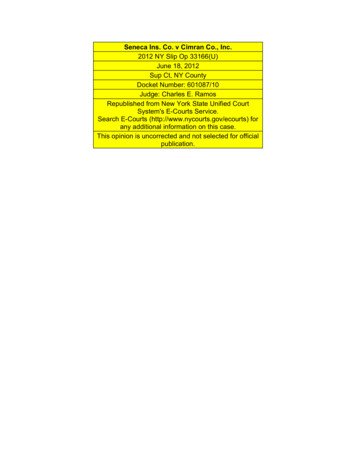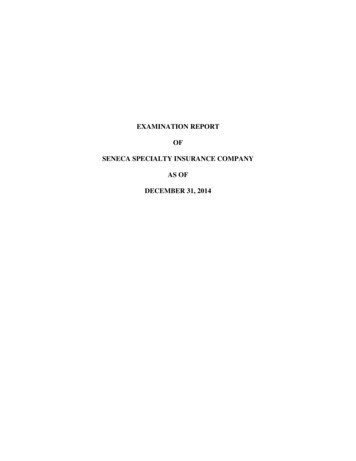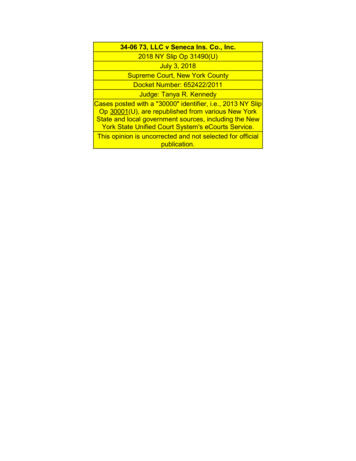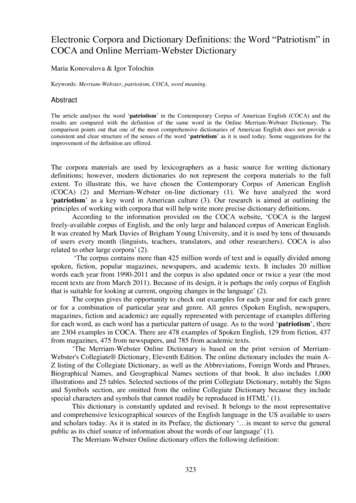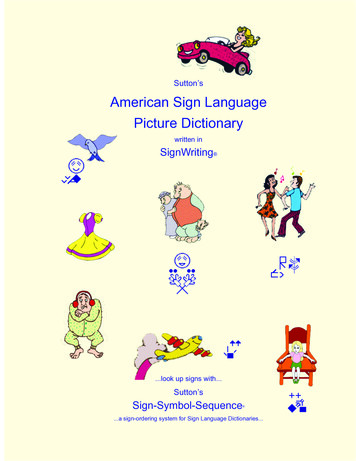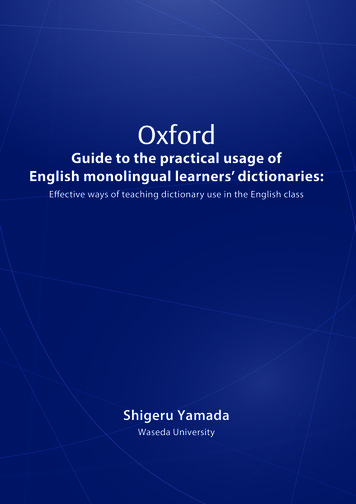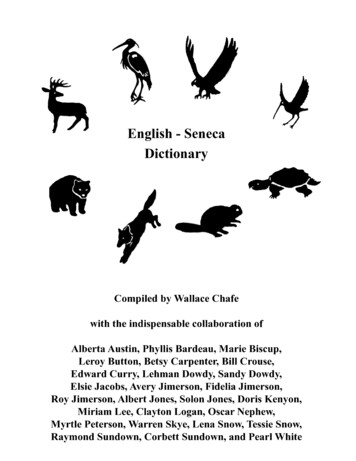
Transcription
lbertJones,SolonJones,DorisKenyon,Miriam down,andPearlWhite
English – Seneca Dictionary2Read Me FirstThis dictionary contains Seneca words that were collected over many years from varioussources, both spoken and written. The collector was not a native speaker of the Seneca language,but he aimed for broad coverage and accuracy in spelling. Producing a dictionary is a humblingexperience, and it is even more humbling when the language is not your own. Aside fromsubtleties of meaning and use that may escape you, there are no boundaries to the resources of aliving language, no point where you can say, “Now I have finished.”There is, however, another problem in the case of the Seneca language. No practicaldictionary can contain anything close to all possible Seneca words. A single Seneca word canoften say what it would take a whole sentence to say in English, and as a result the number ofSeneca words is far greater than the number of English words. No dictionary of reasonable sizecould possibly contain all of them. The entries here are arranged in a way that can be illustratedwith the following:acquire, collect. For example: agyö:gwëh I'vecollected it. ho:ögwëh he’s collected it.go:ögwëh she’s collected it. hodiögwëhthey’ve collected it. gyö:gwas I collect it.hëögwas he collects it. yeögwas she collectsit. hadiögwas they collect it. o’gyö:go’ Icollected it. waëö:go’ he collected it.wa’eögo’ she collected it. wa:di:ögo’ theycollected it. (*-röko-)The heading of an entry (such as ‘acquire, collect’) is an English word, words, or phrasethat translates a meaning that is common to the following Seneca words. Because Englishmeanings do not always correspond to Seneca meanings, these headings may be roughapproximations. When there are two or more English words in the heading, as here, the entry isrepeated elsewhere with the words reversed. In this case there is another entry with the heading‘collect, acquire’.Many headings are followed by For example and then one or more Seneca words. TheseSeneca words are only samples of the many words, often in the hundreds, that could be used totranslate the English. This example lists a few words that combine with ‘I’, ‘he’, ‘she’, and‘they’, and with meanings like ‘has done it’, ‘does it’, and ‘did it’. But there are many otherpossibilities, such as ëhni:ögo’ ‘we (you and I) will collect it’, ëyagwë:ögo’ ‘we (three or moreof us, but not including you) will collect it’, and so on. The particular words included in an entryare only those that happen to have been recorded, often more or less by accident. Furthermore,the order in which the examples are given follows no consistent plan.When there are several possible English translations for the Seneca examples, thetranslations are often those that were accidentally suggested for particular words. Thus, the entryheaded ‘pity, be kind to, have affection for, sympathize with’ includes, among other examples,högi:dë:s they are kind to me, wa:gi:dë:’ he had pity on me, gödë:s I feel affection for you,
English – Seneca Dictionary3ha’dékedë:je’ they are showing sympathy, and so on, but similar translations could be used for any ofthese Seneca words. They simply illustrate the range of possibilities.The examples are followed at the end of each entry by something that looks like(*-röko-). This is a reconstructed ‘base’, from which additional Seneca words can be created,using rules that are described elsewhere. Most users of this dictionary can ignore thisreconstructed base, but a few may be interested in learning how it can be used to create manyadditional words.The following abbreviations are used:ex ‘excluding the listener’in ‘including the listener’du ‘dual’pl ‘plural’masc ‘masculine’fem ‘feminine’neut ‘neuter’Seneca is spelled here with the following letters and other h’a:áà:a in ‘father’e in ‘they’i in ‘police’o in ‘note’u in ‘tune’a in ‘cat’e in ‘men’ (nasal)o in ‘own’ (nasal)1w in ‘wash’n in ‘not’y in ‘yes’d in ‘dog’dz in ‘adze’2t in ‘tail’g in ‘girl’k in ‘kite’s in ‘sit’sh in ‘show’j in ‘job’h in ‘hat’middle of ‘uh-oh’long vowelhigh pitched vowellong vowel with falling gëhdza:dak or :t12But halfway to the o in ‘on’.Some people pronounce dz like �‘it’s tiny’‘it’s s’‘six’‘near’‘seven’‘it’s cold’‘four’‘I saw her’‘three’‘your name is’‘nine’‘father’‘no’‘she said it’‘shoe’‘it will pass’
English – Seneca Dictionary-Aable, possible. For example: ogwe:nyö:h it'spossible. agegwe:nyö:h I'm able (to dosomething). o’gegwe:ni’ I was able.o’gagwe:ni’ it was able. niyagwagwényösgwa’ how much we used to be able.(*-kweni-) See beat (in a contest).abortion. sgayágëöh. Literally it's been takenback out. (*-yakëh-) Alsohse:hshe's had an abortion. Literally he's taken itout for her. (*-yakëhs(e)-)about, approximately. gë:öje’,,. (*-ihö-)aboveone'shead.Forexample::dih above people's ants.:ya:t.(*-’ehohtakëhyat-)above, over, up. he’tgëh.absolutely! do::wa:h! (tokëhskowa:h)abundant, be. odáhö:dö’ or:dö’ there's alot of it. niyódahö:dö’ or niyódöhö:dö’what a lot of it there is. (*-ataChötö-)abundant, be; live, dwell. For example:ëganöge:k it will continue to be living.ëyenöge:k one will be living. De’ganöge’(woman’s name). Literally it's not abundant,it’s rare. (*-nakr(e)-)abuse (noun). (*-nöhkötahshr-)abuse (verb). For example: shagónöhgö:ta’ heabuses her.:he abusedher. (*-nöhköt-) See also mistreat, nyadáda’gé:oyën you (du) might abuseyourselves. Literally slam yourselves withashes. (*-atata’këhraoyëht-)abut. deyodi:göh it abuts it. (*-atrik-)accident, have an. For example: ögádi:waje:ö’I had an accident. wáódi:waje:ö’ he had anaccident. ëyagodí:waje:ö’ people will haveaccidents. o’wádi:wajeö’ it caused anaccident. tö:sadí:waje:öh you will not havean accident. (*-atrihwatyerö-)accident. ajéöshä’. (*-atyeröshr-) Also:adí:wajéöshä’. (*-atrihwatyeröshr-)4accomplish, (with patient prefix) gather,assemble. For example: agyéisdöh I'veaccomplished it. hoyéisdöh he hasaccomplished it. ëgye:is I will accomplish it.wa:ye:is he accomplished it. waodiye:isthey gathered, assembled. jögwayéísta’ wegathered, assembled there. (*-yerihst-)accountant, census taker. hashe:das. Literallyhe counts. yöshe:das. Literally she counts.(*-ashet-)acorn, red oak (Quercus velutina, Quercusborealis). ogo:wä’. (*-kor-)acquire, collect. For example: agyö:gwëh I'vecollected it. ho:ögwëh he’s collected it.go:ögwëh she’s collected it. hodiögwëhthey’ve collected it. gyö:gwas I collect it.hëögwas he collects it. yeögwas she collectsit. hadiögwas they collect it. o’gyö:go’ Icollected it. waëö:go’ he collected it.wa’eögo’ she collected it. wa:di:ögo’ theycollected it. (*-röko-)acrobat, clown. hajánö’ta’. Literally he doestricks. (*-atyana’t-)act correctly, do the right thing, be careful.For example: ögwajë:nö:ni:h we're actingcorrectly, are careful. wa’öjë:nö:ni’ she didthe right thing, was careful. waënöjë:nö:ni’they did the right thing. wa’agwajë:nö:ni’we did the right thing. ëdwajë:nö:ni’ wewill do the right thing. ëswajë:nö:ni’ youwill do the right thing. ë:nöjë:nö:ni’ theywill do the right thing. sajë:nö:nih! actcorrectly! ëöjë:nö:ni’ he'll do the rightthing. ëjísnyajë:nö:ni’ you two will do itcorrectly again. (*-atyërënöni-)act stubbornly, obstinately. For example:wá:dë’gwä:yë:’ he acted stubbornly.o’wádë’gwä:yë:’ it acted stubbornly.(*-atë’kwarayë-)act unexpectedly. For example: hojéösgö:h heis acting unexpectedly. ó’ne:dë’ he put one coat on overanother, said it over again. (*-atna’net-)add one thing over another. For example:o::t it has one thing added overanother, goes in steps or series. sho::tthe one who's next in line, subchief,vice-president. deyó:nö’ne:t two storyhouse. do:gwah niyó:nö’ne:t multi-story
English – Seneca Dictionaryhouse. degá:nö’ne:t it's lined (clothing).:dë’ you will double it over.(*-hna’net-)add something. For example: agáwëhda:döhI've added something to it. (*-awëhtat-)add to skins. o’šóhsa’ne:t added to skins.(*-’syohsa’net-)add to what was said. For example:ëgí:wa’hö:dë’ I'll add to what was said.ëhsí:wa’hö:dë’ you will add to what wassaid. hë:nì:wá’hödë’ they two will take upthe matter. (*-rihwa’höt-)add up to (with ordinal numerals). wadö:ta’ itadds up to. (*-atöt-)added, be. o’hö:n it's added. (*-’höt-)added. ëtšes. Sga:t washë:h ëtšes. One addedto ten. (*ëtshehs)addition (to a house). heyo:sgö:n. Literallyattached shed. (*-asköt-)address words to someone. For example:hëöwödwënögáhdë’ they will addresswords to him. ëgwadwënögáhdë’ we willaddress words to you. (*-atwënakaht-)address words. For example: ëgwënögáhdë’ Iwill address words. (*-wënakaht-)adhere to a tradition. For example:hegí::twas I adhere to the tradition.(*-rihwatihëtho-)Adirondack tribe. Hadiöda:s. Literally theyeat trees. (*-rötak-)Adö:wë’, accompany someone's. For example::nih he accompanies myAdö:wë’. ample:he has accompanied Adö:wë’(bychantinghe’he’he’.).you will accompany mein Adö:wë’. ë:they willaccompany Adö:wë’. (*-atöhishëht-)Adö:wë’. Adö:wë’ (personal chant).adopt a child. For example: agéksa’dëögwëhI've adopted a child. höwthey've adopted him. o’géksa’dëögo’ Iadopted a child. (*-ksa’taröko-)adopt a person. For example:I adopted someone. (*-ökwe’taröko-)adopt. For example: heyásdéísdöh I've adoptedhim. é:yasde:is I'll adopt him. (*-asterihst-)adult, become. See grow up, become an adult,grow to maturity.5affair come to the end. heyódio’k it’s the endof the affair. (*-atriho’kt-)affair go to a certain point. ha’deyóíwakdá’öhit’s all the affair there is. (*-rihwakta’-)affect badly, kill. For example: agajo:ö’ I'vekilled it. o’gajo:ö’ I killed it. eonöjo:ö’ itwill affect them badly. (*-atyorö-)affect strongly. For example: wáóde’hásdö’s itaffected him strongly. (*-ate’hastöni/’s-)affect unexpectedly. For example: ffected by something, be. See use a way togo. (*-ehtahkw-)affection for, have; be kind to; sympathizewith; pity. For example: högi:dë:s they arekind to me. shögwë:dë:s he is kind to us.agidë:öh it has been kind to me. godë:öh ithas been kind to her. o’ke:dë:’ I pitied her.hagi:dë:s he's good to me. höwö:dë:s she'skind to him. shago:dë:s he's kind to her.ösa:dë:s she loves you. gödë:s I feelaffection for you. wa:gi:dë:’ he had pity onme. ësgwëdëse:k you will continue to bekind to us. á:sgwëdë:se:k you should bekind to us. ögi:dë:s she is good to me.ke:dë:s I am good to her or them.ögi:dë:sgwa’ she was good to me.niyögid :sgwa’ how she used to be good tome.:hse:k you will continue to bekind to us. á::hse:k you should bekind to us. dasgi:dë:h! have pity on me!á:sgi:dë:’ you should have pity on me.ha’dékedë:je’ they are showing sympathy.(*-itër-)afraid of, be. For example: geshá:nis I'm afraidof it. hashá:nis he's afraid of it. yeshá:nisshe's afraid of it. hadísha:nis they're afraidof it. wadísha:nis they (fem) are afraid of it.(*-shahni-)afraid of, become. For example: agésha:ní’öhI've become afraid of it. hoshá:ni’öh he'sbecome afraid of it. goshá:ni’öh she’sbecome afraid of it. (*-shahni’-)African American. HáAfrican American.Hadíö’ji’ African Americans. (*-hö’tsi-)after a while, eventually.:’öh after awhile, eventually. (*tha’karë’öh)after midnight. o’wáhsödádia’t. Literally thenight becomes unequal. (*-ahsötatiha’-)
English – Seneca Dictionaryafterbirth.:h :nö’. Literally whatit was in. (*-ate’nöhtaraht-) See also uterus,afterbirth. (*-wiratahko-)afternoon.:hgwa:’ah. (*-rahkwar-) Also:. Literally the day becomesunequal. (*-ëhnihshratiha’-)afterward, behind, in the back, last. nö’gë:’.again. ae’. (*are’) Also nae’.age, be a certain, cross so many winters. Forexample: niwágoshíya’göh how old I am.Literally how many winters I have crossed.tšiwágoshíya’göh when I was a certain age.Literally when I had crossed so manywinters. nö’désoshíya’göh how old you are.Literally how many winters you havecrossed. nö’góshi:ya’k how old I was.Literally how many winters I crossed.nö’sóshi:ya’k how old you were. Literallyhowmanywintersyoucrossed.sahsóshi:ya’k you went through anotheryear. tá:goshi:ya’k I wouldn't pass (acertain age). (*-oshriya’k-)agree to something, consent. For example:I've consented, I'm willing,.hoga:yëshe's(always)willing.waodiga:yëh they consented, agreed to it.waogayëh he consented. ësagayëh you willconsent. aesaga:yëh you might consent.:yëhwe(du)consented.ëswagayëh you (pl) will consent.eodiga:yëh they'll consent. da’awagegayëhI'm not willing. de’ogayës it isn't la).ye’áhšohga:ta’. Literally one uses it tospread on a basket. (*-’ahshrohkat-)ah (thinking of what to say). a:h.aha. m. For example: o’táde’sägë:ni’ he aimed atit. ho’táde’sägë:ni’ he aimed in thatdirection. (*-ate’srakëni-)aimlessly, inappropriately, out of line,without a purpose. gwa’. (*kwa’)airplane. dega:dëh or dega:dës. Literally itflies. (*-të-)Akron, New York. Heyó:ögëh. Literally heardover there. (*-ahrök-)Albany, New York. Sga:néhdadih. Literally onthe other side of the ridge. (*-hnehtati-)6alcoholic, be. See like to drink, be alcoholic.(*-hnekaka’hast-)algae, sweetflag (Acorus calamus). óéohgwa’.Literally vegetable matter floating on water.(*-Cehohkw-)alight, land. For example: o’g:da’t italighted, landed. o’jé’jö:da’t she alighted,landed. (*-i’tröta’-)alive (of several things). For example:tën henyök they were alive then.(*-önhenyö-)alive, be; live. For example: göhe’ I'm alive.söhe’ you're alive. yagö:he’ she's alive.höhe’ he lives, is alive. ëyágöhe:k she willbe living.wënö:hek they (fem) were alive.de’w nöhek they (fem) weren't alive. jöhe’our (in pl) lives. tšigö:he’ since I've beenliving. tijö:he’ we (in pl) are just living.ní nöhö’s infants, babies. ní nöh s’ahinfants, babies. tiyágöhe’ she is still alive.sgöhe’ I'm still alive. agyö:he’ we (ex pl) arealive. de’j he’ö:weh we are not living a reallife. (*-önh(e)-)All Eaten Up (a ceremony for the dead).Gahsá’ö:’. (*-hs(a)’-)all over in back.ë’shö’. (*onö’kë’shö’)all over the inside. ögyéshö’. (*ökyeshö’)all right, amen, so be it. nyoh. (*nyoh)all summer.:göh all summer.(*-kënhakwek-)all that's left to do. hewe:gë:h it's all that's leftto do. (*-ek-)all the earth.:göh over the wholeearth. (*-ityohkwakwek-)all the words. For example: hadiwënögwe:göhall their words. gawënögwe:göh all thewords, the whole message. (*-wënakwek-)all year. niyo:shi:s all year long. (*-oshris-)all. gagwe:göh all, everything, everyone.agwagwe:göh all of us. hadigwe:göh all ofthem. digwe:göh both of them. tigagwe:göheverywhere, all over.:ök it willcontinue to be all of us. (*-kwek-)Allegany Reservation people. Ohíyo:onö’.(*-iyhiyo-)Allegany River or Reservation. Ohi:yo’.Literally good river. Ohi:yó’gwa:h towardsAllegany. (*-iyhiyo-)
English – Seneca Dictionaryalligator, Alligator Dance. degá’nö:dö:n.Literally thick stalks attached. (*-’nötöt-)all-night ceremony for the dead, particularlyOhgi:we:h. Gayëdö:’shä’. (*-yëtö:’shr-)almost, nearly. to:hah. (*thohah) Also gwe’ta’.(*kwe’tha’)alone, be left. agyá’dosgá’ah by myself alone.hodíya’dósga’ah by themselves alone.na:wagyá’dosgá’a:k I could be left withoutanything. de’óya’dósga’ah the body not leftby itself. de’dzagoyá’dosgá’ah she'spregnant. Literally it's not just her body anymore. (*-ya’toska-)alone, be. For example: gya’di:h only me, Ialone. yeyá’di:h only her, she alone.hayá’di:h only him, he alone. hiyá’di:h thetwo of them alone. hegáya’di:h that's all ofit, just plain. ha’dégya’di:h I'm ’di:h I'm the only one left.yeyá’di:aje’ each person in turn.de’šá’di:aje’ you are being alone.ha’dà:yá’di:h he was alone. (*-ya’ti-)alone, cause to be. For example: o’dwágya’disI was the only one. ha’deyögwáya’dísdöhit's made us all alone. ha’dösawágya’dis Ibecame all alone again. (*-ya’tihst-)already. o:nëh nä:h.also, too.:’gwah. (*hae’kwah)Alternate Feet Dance, Doorkeepers' Dance.:hsí’dadías. talternates.(*-ahtiha’t-)always, each time, at all times. jáwë’öh.(*tyawë’öh)always. jotgö:n always, forever. o’wátgö:dë’ itsettled permanently. wá:tgö:dë’ he settledon it. (*-atköt-)amaze, surprise, inspire with awe. Forexample: ögí::go’ I was surprised.wáóiwánä:go’hewassurprised.::go’ we were surprised.waodí::go’ they were surprised.agí::gwasIgetsurprised.hodí::gwas they get surprised.(*-rihwanehrako-)amen, all right, so be it. nyoh. (*nyoh)amomum (Amomum sp).Literally used for laying down coals.(*-tsistayëtahkw-)7among, be. For example: ëgëönyö:k it will beamong them. (*-rönyö-)amount to. wadö:ta’ it amounts to. hadö:ta’ heamounts to. (*-atöt-)amount, be a certain. ni:yö:h how much, howmany; a little bit. ha’de:yö:h everything, allkindsofthings.dedza:öhboth.dedzá::h toward both sides, at bothends. ha’déyöshö’ all kinds of differentthings. dejí: :gwa:h toward both sides.(*-ö-)amount, become an.it became anamount. ígöëwënye:’ you (pl) will amuseyourselves. (*-atatniköhrawënye-)amusing, cute, funny. oja:nön it's funny,comical. saja:nön you're cute. honöja:nönthey're amusing. (*-atyanaht-)ancestors.Forexample::ö’ our ancestors.(*-hsoshr-)and, also. koh. �’se:ak you will be angry at us.(*-na’khwa’se-)angry at things, become. For example::nö’ we didn't get mad atthings. (*-na’khwëhnö-)angry, become. For example::kdöhI'm angry. o’gádehga:ak I got angry.:kdöh she is angry there.:ak she got angry there.(*-atehkarakt-)angry, become. For example:I'mangry.she'sangry.he's angry.Ibecame angry, got mad.hshe became angry. wáónö’kwëh he becameangry.they became angry.:ök you will keep being angry.(*-na’khwë’/h-)animal land somewhere. o’tgánö’sgo:da’t itlanded. ho’tgánö’sgo:da’t it landed there.(*-na’skota’-)animal, big. ganyó’dowa:nës big animals.(*-ryo’towanë-)animal, domestic; pet, slave. ganö:sgwa’.(*-naskw-)animal. ganyó’da’. (*-ryo’t-)
English – Seneca Dictionaryanimals, all. ha’deganyó’dage:h all theanimals. (*-ryo’take-)ankle. ojío’gwa’. gejío’gwá’geh (on) my ankle.(*-tsiho’kw-)announce. For example: dahsíowa:nën youannounced it. ëtšíowa:nën you willannounce it. dáiowanën he announced it.táíowánëta’ announcer. (*-rihowanëht-)announcer, officiator. háíwahsa:ha’. Literallyhe begins things. (*-rihwahsaw-)annoy. For example: agésha:níhdanih itannoys me. (*-shahnihtani/ë-)annoyed, be. For example: agésha:nit I'mannoyed.goshá:nitshe'sannoyed.hoshá:nit he's annoyed. goshá::nö’she used to be annoyed. (*-shahniht-)annoyed, become. For example: agáhgáíë’öhI'm annoyed.’öh she's annoyed.he's annoyed. agáhgáíës I'mbecomingannoyed.gohgáiësshe'sbecoming annoyed. hohgáiës he's becomingannoyed.they're becomingannoyed. ögáhgáíëh I became annoyed.(*-ahkarihë’/h-)annoying, become. For example: ögésha:níte’tit became annoying to me. (*-shahnihthe’-)another one, a different one. o:ya’ anotherone, a different one. o:yá’shö’öh í:gwa:h toward other places. (*-hy-)another person. For example: shayá’da:t oneman, another man. dzeyá’da:t one woman,another woman. shadíya’da:t the otherones. (*-ya’tat-)answer. For example: dödágesnye’t Ianswered. (*-snye’-)ant, red. hi’nö’. (*hi’nö’)ant. (*-nhöstohkwë’)anteater. gahsáhdögwas. (*-hsahtöko-)anus. o’yágaën anus, also a kind of squash.(*-a’yakahrët-)anxious, expectant. For example::ë’ I'mexpectant, anxious. Literally my mind is init. honígö:ë’ he’s expectant, anxious.Literally his mind is in it. *katka’hoh)apparent, be; show. oyë:de:t it shows, isapparent. (*-yëtet-)apparent, become; come to light.ithas become apparent, come to light.8ëyoyëde:te’t it will become tethe’-)apparently, it seems. a:yë:’. (*aayë:’)appear momentarily, in glimpses. dawátgë’ö:’it appeared there momentarily, one caught aglimpse of it.:je’s they areappearingbriefly.(*-atkë’ö-)Alsowën tg :nöh they keep appearing inglimpses. dodáhsa’se:h he has appeared to me.(*-atotahsa’s(e)-)appear, show oneself, come to light. Forexample: o’wadodáhsi’ it appeared, showeditself, came to light. hodódahsö:h he hasappeared. ëyododáhsi’ it appear. (*-atotahs-)appear. For example: o’wajeöni’ it appeared.(*-atyeröni-)appendix. yohó’dani:yö:n. (*-nho’taniyöt-)apple. ga::ya’ or ga:nyö’o:ya’ (fromga::ya’ "white man's fruit")(*-hnyö’ö-)apply, spread on. For example: hohga:s he'sspreading it on. agóhga:h I've spread it on.o’góhga:’ I spread it on. ëhsóhga:’ you willspread it on. ëyágohga:’ she will spread iton. (*-ohka-)appoint a time or place, point out. Forexample: ag :wö:n I've pointed it out, set atime or place. wá wödë’ he pointed it out.wá nö:wö:dë’ they pointed it out. ëj :wödë’we will appoint it. níónö:wö:n what theyappointed. h :nö:wö:dë’ they will appoint adate. níáöwö:n how he has set it, appointedit. ga:öwö:n she has pointed it out.(*-öhwat-)appoint things. For example::wödö:’ itwas appointed. (*-öhwatö-)appoint, give an assignment to. For example:shögwáiö:n he has appointed us.:nhe has assigned it to them. shagóiö:n he hasassigned it to her.he hasfinally assigned it to her.hehas finally assigned it to him.he has finally assigned it to them. a’dágë:ya:dë’ they nominatedthem, appointed them. Literally they putthem on top.:ya:t nominee.
English – Seneca DictionaryLiterally they have put him on top.(*-ya’takëhyat-)appoint, put on top. For example: agégë:ya:tI've put it on top, appointed it.:yadë’they will appoint it. (*-këhyat-)appraiser. hagä:dógësta’. Literally he makesthe price right. (*-karatokëhst-)approve after discussion, reach agreement.For example::he’t theyapproved the matter after (*-wëna’tihhe’-)approximately, about. gë:öje’,,. (*-ihö-)April (approximately). O’nót’ah. (*-’not’ah)apron. ëní:nodá’shä’. (*-ënihnota’shr-)apron. yëní:nodáhgwa’ apron, woman's apron.ëní:nodáhgwa’ man's apron. (*-ënihnotahkw-)area on the ground, big. jo:né’šowa:nëh bigarea on the ground. (*-hne’srowanë-)area, space, room, time, bed. onö:kda’ space,room, area, time. ganö:kda’ bed (withoutbedding).kda’geh on the bed, in thestate of the US. (*-nakt-)argue, make trouble. For example: háíhä:s heargues. agi:ha:’ I'm arguing. do:dí:hä:kthey didn't argue. (*-riChar-)argue, quarrel. For example: degí:wage:has Iargue. dáiwágehas lawyer. Literally heargues. de:nì:wágehas they (masc du)argue. dewági:wágehëh I'm arguing.o’tgí:wage:ha’ I argued. o’tadí:wage:ha’they quarreled, argued. dëknì:wágeha’ theytwo will argue. do:dí:wage:hëh they arearguing. (*-rihwakenh-)argue. For example: ëgádiha:ë’ I'm going toargue. ë:nödíhaë’ they will argue.a:yagwádiha:ë’ we wouldn't argue.(*-atriChar-)argument about things, start an. For example:dëgádashá’hö:’ I'll start arguing aboutthings. (*-atash(a)’hö-)argument, start an. For example: o’tgádas’a:’I started an argument. dewagadásha’öh I'vestarted an argument. dá:das’as he startsarguments. (*-atash(a)’-)arid, dry. ohá’döh it's dry, arid. gahá’döh whathas been dried. de’óha’dá:nö’ it isn't dry.(*-rha’t-)9arise. For example: ëdwája’dágesgo’ we willarise. (*-atya’takesko-)arm be extended. For example:hisarm is extended (in this direction).(*-nëshate-)arm cut off. For example:hisarm is cut off. (*-atnëshiya’k-)arm. For example: onë:sha’. knëshá’geh (on)my arm.(on) his arm.(on) her arm. (*-nësh-)armband, bracelet. Literally itencircles one's arm. (*-ënëshanhahst-)Arm-Shaking Dance. Literallydropping the arm. (*-nëshë’t-)around, be. For example: áëné’se:k they mightbe around. agwe’s we (ex pl) are around.akne’s we are going around. dë:ne’s theytwo will be around. de’ë’s she isn't around.dehsé’sgwa’ you used to be around.deswé’sgwa’ you all used to be around.ëhsé’se:k you'll be around. ëtgé’se:k I willbe there.:k they will accompany it.ëyé’se:k she'll stay around. hë:ne’s they'rearound. hegé’sgwa’ I used to be aroundthere. hëswé’se:k you (pl) will be aroundthere. hne’sgwa’ they two used to bearound. i:ge’s I'm around, I'm present. i:ne’sthey (du) are around, going together. i:yë’sshe's around. ie’s he's around. jagwe’s weare around there. ta:yagwé’se:k weshouldn't be around. táëné’se:k they won'tbe around. të:ne’s they're around there. tie’she's around in an unusual way. tšidwe’swhen we've been around. tšijë’s when shewas around. (*-e-)around, be.:ne’s it's e:dëöwödíä’ne:gë:’ they'll put them together,arrange a marriage. (*-ra’nekë-)arrange, referee, manage. For example:hasdéistha’ he manages it, arranges it,referees. agásdéísdöh I'm arranging it.they're managing it, referees.(*-asterihst-)arrest. For example: höwödiye:nö:s they arrestthem. Literally they grab them. (*-yenö-)arrive (middle voice). For example:hejójö’döh it has gone back there. ëswö:jö’tit will arrive back there. hëswö:jö’t it willarrive back there. (*-atyö’t-)
English – Seneca Dictionaryarrive (of a person or people). For example:o’gyá’da’di:he’t I arrived. ëshadiyá’da’di:he’t they will come around again.(*-ya’ta’tihhe’-)arrive eventually. For example: héóyös’öh heeventually got there.s’öh theyeventually got there.theyeventually got back there. (*-(in)yöhs’-)arrive somewhere. For example: hë:öyö’ hewill arrive there. hëgyö’ I'll arrive there.hwa’e:yö’ she arrived there. hëhdzö’ youwill arrive there. hëyagwayö’ we will arrivethere. (*-(in)yö-)arrive, come back, return. saye:yö’ she cameback. sa:ayö’ he came back. sayagwayö’ wecame back. sa:di:yö’ they got back.dëje:yö’ she will come back. dëdidwayö’we will come back again. de’sha:yöh hedoesn't come back. dödà:yö’ he arrivedback there. dödayagwa:yö’ we arrived backthere. hësgyö’ I'll get back there.hösà:di:yö’ they arrived back there.dödaye:yö’ she came back. dödáhšö’ youarrived back here. hëshádi:yö’ they willarrive back there. de’sho:yö:h he hasn'tcome back. nishodi:yö:h how they have gothome again (runs in a baseball game).(*-(in)yö-)arrive, come in. For example: dagyö’ I camein. daga:yö’ it came in. da:ayö’ he came in.da:ni:yö’ the two of them came in.:je’ we (ex pl) are arriving.ëtod :je’ they will be coming here.jo:yö:h it has come in. jögwa:yö:h we havearrived here. dadzöh! come in! deto:yö:hhe has returned. :dahšö’ you might arrive.ho:yö:h he has arrived.:je’ theywill be arriving. ëtadi:yö’ they will comehere. dëtadi:yö’ they will come back here.:da:ayö’ he would come back there.(*-(in)yö-)arrive. For example: o’gyö’ I arrived. wa’e:yö’she arrived. wa:ayö’ he arrived. wa:di:yö’they arrived. agyö:h I've arrived. ha:yöh hearrives. hë:öyö’ he will arrive there.:je’ people are arriving. tsa’ga:yö’when it arrived. (*-(in)yö-)arrow. ga’nö’ arrow. o’nö’ its arrow. ho’nö’ hisarrow. (*-’n-)arrowhead, flint. (*-athrakwë’t-)10arrowwood (Euonymus atropurpureus (?)).ga’ga:’ wa:ya:s. Literally crow eats theberries.arteries (streams) in it.:ya’dëönyö:kthere will continue to be streams in it.(*-tsinahya’tarönyö-)artery, vein, cord. ojínö:yá’da’. (*-tsinöhya’t-)artificial, imitation, pretense, be. a:we:t it'sartificial, imitation, a pretense. (*-et-)artist. hayá’daha’. Literally he makes pictures.(*-ya’tar-)as soon as, when. ga:nyo’ or ga:nyo’t.ash sifter.:wö:kta’. Literally people use itfor sifting ashes. (*-a’këhrawakt-) Also:’ yöwö:kta’. (*-awakt-)ash, black (Fraxinus nigra). kwaras-)ashamed, embarrassed. For example: gadéës Iget ashamed, embarrassed. yödéës she getsashamed, embarrassed. hadéës he getsashamed, embarrassed.I'mashamed, embarrassed. o’gádeëh I gotashamed, embarrassed. wá:deëh he gotashamed, embarrassed. o’sádeëh youbecame ashamed, embarrassed. (*-atehëh-)ashes, powder, dust.:’ (*-a’këhr-)aside, be left. For example: tonödägwáhse:hthey have been left aside. niswadägwáhse:hhow you (pl) have been left aside.(*-atrakwahs(e)-)ask (intransitive). For example: o’gáda:ödö:’ Iasked.:ödö:’sheasked.wá:da:ödö:’ he asked.:ödö:’ theyasked. wa:yáda:ödö:’ they two asked.o’wáda:ödö:’ it was asked. sadá:ödö:h!ask!:’ I ask.:’ they �:’ he asked for her.tsa’gáda:ödö:’ when I asked. (*-atahrötö-)ask (somebody something). For example:wáéya:ödö:’ I asked him. o’kéya:ödö:’ Iasked them. wá:ga:ödö:’ he asked me.:ödö:’ she asked me.:ödö:’they asked me. heyá:ödö’ I've asked him.:’ he is asking me. hehsá:ödö:h!ask him! wa:ödö:’ he asked. o’shága:ödö:’he asked her. o’shagó:ödö:’ he asked her.(*-ahrötö-)
English – Seneca Dictionaryaska lot of questions. For example:hadáödö:nyöh he asks a lot of questions.(*-atahrötönyö-)ask for, beg. For example: agé’ne:gëh I'vebegged for it. (*-’nek-)ask for, beg. For example: agé’ne:gëh I'vebegged for it. (*-’nek-)ask for, request. For example:Irequest, ask for it.herequests it, asks for it. o’gádö:išök I askedfor it.they asked for it.wá:he asked for it.they have asked for it.it isprayed.ëhsádöišökyou'llrequest.what he asked for.:g it will be prayed.(*-atöhisyöhkw-)ask forgiveness. For example: gadanidë:sta’ Iask forgiveness. (*-atanitërst-)ask someone for something. For example:I'm asking you all for it.she will ask me for it.:ni:h they have requestedme. (*-atöhisyöhkwani/ë-)ask thin
Seneca Dictionary - Seneca Language - A Conversational Seneca Language Page . e'. . . . .
